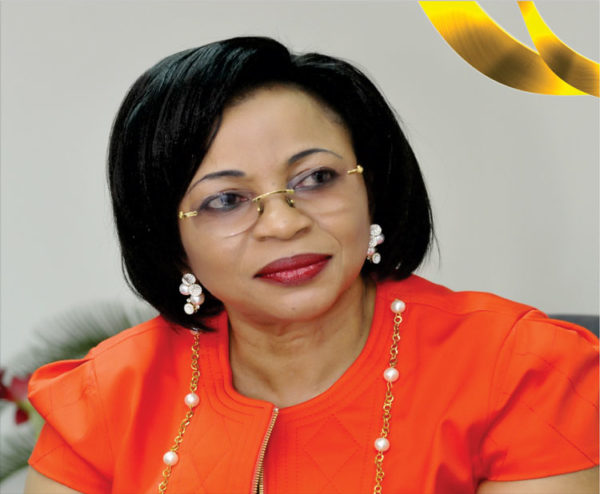Oil Bloc: Folorunsho Alakija “Deserves Commendation And All The Accolades For Growing Her Company,” Says Energy Consultant In Op-Ed
A few weeks ago, Africa’s richest woman Folorunsho Alakija posted a series of tweets that caused ripples on the social network.
The first oil bloc which she acquired by her company Famfa Oil was accepted by “faith,” she had said, adding that no other company wanted it.
In her tweets, Alakija said that her faith in and covenant with God helped her when she got to her wit’s end, and she was able to thrive and grow her business to achieve the success it has today.
Twitter users were divided over the issue, some saying she was gifted the oil bloc because of her relationship with the then first family – she was late Maryam Babangida, wife of General Ibrahim Badamosi Babangida‘s fashion designer. Another set of because were content to “tap into the blessings” as she ended her tweets with a prayer that readers should “receive the anointing to prosper.”
In an op-ed for Premium Times, Odion Omonfoman, an Energy Consultant and the Managing Director of New Hampshire Capital Ltd., wrote in defence of Alakija, corroborating her claim that no company wanted the bloc because of its uneconomic status at the time and exploration would be much more capital intensive due to its location.
Omonfoman’s article was a response to a series of tweets by journalist Kayode Ogundamisi (@ogundamisi) accusing Alakija of “fronting for some people in Aso Rock” who all “knew they had a juicy oil bloc”. “They shortchanged Nigerians and as usual and continue to mock us,” he added.
Ogundamisi added that what people like Alakija in “Nigeria won’t tell young Nigerians is that a wing of the ruling elite appropriate resources belonging to all to a wing of the elite in the business community in what is a brutal version of capitalism, keeping the poor, poorer, hungry and dejected.” (
Omonfoman, in response said:
Famfa Oil, owned by Mr. and Mrs. Alakija, applied for and was awarded OPL 216 in 1993. Mrs. Alakija, a fashion designer of repute and an entrepreneur, is alleged to have used her access to the then first family to seek the oil block at the twilight of the IBB regime. Many say it was compensation for her loyalty and work to the first family.
Two things strike me about this story which disputes this allegation and lends credence to Mrs. Alakija’s entrepreneurial status, tenacity and focus as the main reason she got the block. First is the fact that Famfa Oil was incorporated in 1991, obviously when the first round of awards was issued and granted. This shouldn’t be strange as all Nigerian companies awarded OPL licenses to were also incorporated then. Her company Famfa, clearly wasn’t favoured in that first round, despite her supposed closeness to the then first lady.
Second is that Mrs. Alakija must have had a very clear vision of her future and didn’t “stumble luckily” into big oil. Despite a price tag of US$1.5 million, she still persisted and went ahead to apply for an oil prospecting license for a second time two years after her first attempt. Mrs. Alakija certainly did not set out to acquire OPL 216. She was only “unfortunate” to be awarded the block no one wanted.
Now was Mrs. Alakija and Famfa Oil undeservedly awarded the OPL by the IBB regime? The answer is clearly “No” as the award of the OPL to Mrs. Alakija and her company followed the rule of law and the guidelines for discretionary awards. Mrs. Alakija must have met all requirements leading to the award, or eventually perfected them with time as many in her shoes did then. In addition, the award of the OPL to Mrs. Alakija had no conflict of interest as is the case with OPL 245 (Malabu Oil).
One must recognise that the head of state then had the powers to make such discretionary awards. Thus it is illogical to claim that Mrs. Alakija and Famfa obtained the block fraudulently or she was acting as a front to the former military ruler and his family. In addition, OPL 216 was awarded on a Sole Risk basis, meaning that Famfa and her promoters were solely responsible for developing the block without the participation of the Nigerian government. Many Sole risk operators have gone bankrupt just simply trying to explore their blocks.
After trying unsuccessfully for years to enter into development agreements with several IOCs, Omonfoman said, Famfa Oil finally entered into a Deed of Agreement (DoA) with Star Deepwater (Texaco), in which Star Deepwater was assigned 40 percent participating interests in OPL 216, in 1996.
Alakija’s breakthrough came when Agbami Field with estimated P50 recoverable reserves of over one billion barrels of oil, was discovered in 1998, Omonfoman said, adding that today, it produces over 200,000 barrels of crude oil and gas liquids.
Omofoman concluded his article by saying “Alakija deserves commendation and and all the accolades for her role in growing her company,” adding that “Famfa Oil needs to add value to its share of crude oil and gas production from OML 127 (OPL 216) by strategic investments in midstream and downstream infrastructure within Nigeria.”

